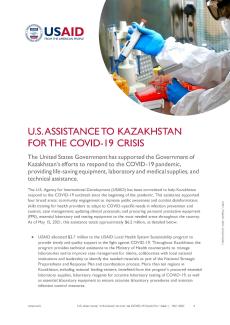The United States Government has supported the Government of Kazakhstan’s efforts to respond to the COVID-19 pandemic, providing life-saving equipment, laboratory and medical supplies, and technical assistance.
The U.S. Agency for International Development (USAID) has been committed to help Kazakhstan respond to the COVID-19 outbreak since the beginning of the pandemic. This assistance supported four broad areas: community engagement to increase public awareness and combat disinformation; skills training for health providers to adapt to COVID-specific needs in infection prevention and control, case management; updating clinical protocols; and procuring personal protective equipment (PPE), essential laboratory and testing equipment to the most needed areas throughout the country. As of May 15, 2021, this assistance totals approximately $6.2 million, as detailed below.
- USAID allocated $2.7 million to the USAID Local Health System Sustainability program to provide timely and quality support in the fight against COVID-19. Throughout Kazakhstan, the program provides technical assistance to the Ministry of Health counterparts to manage laboratories and to improve case management for clients, collaborates with local national institutions and leadership to identify the needed materials as part of the National Strategic Preparedness and Response Plan and coordination process. More than ten regions in Kazakhstan, including national leading centers, benefited from the program’s procured essential laboratory supplies, laboratory reagents for accurate laboratory testing of COVID-19, as well as essential laboratory equipment to ensure accurate laboratory procedures and maintain infection control measures.
- USAID provided $500,000 to United Nations Children’s Emergency Fund to support COVID-19 prevention and response activities to reduce transmissions and mitigate the impact of the pandemic through risk communication and community engagement; provision of critical supplies for schools; improving infection prevention and control measures, providing water, sanitation, and hygiene services, and enhanced data collection and analysis.
- A Social-Economic Impact assessment of COVID-19 was conducted with a focus on migrant children (report forthcoming).
- One hundred thirty-eight (138) social media posts with life-saving information and COVID preventive practices were published that reached across all platforms around 350,000 people.
- Gender-based violence and intimate partner violence (GBV/IPV) webinars were provided to 50 service providers and police to support ethical approaches for service provision in the context of COVID-19.
- Over 194,000 children attending 2,830 rural schools benefited from the COVID-19 prevention supplies and education materials, including 84,900 posters with messages on infection and prevention control practices and promotion of hand washing.
- In partnership with the non-governmental organization Korgau, 269 women with children in difficult life situations in 5 regions (Nur-Sultan, Karaganda, Aktau, Shymkent and Kyzylorda cities) received psycho-social online and face-to-face counselling by trained specialists. Over 570 healthcare workers of perinatal centers across 17 regions of Kazakhstan were trained on infection prevention and control and water, sanitation, and hygiene.
- USAID provided $406,185 to the World Health Organization (WHO) to conduct virtual trainings on COVID-19 related topics such as laboratory testing and management and infection prevention and control (IPC) in health care settings. Over 4,000 healthcare workers and public health professionals participated in the trainings. To support the IPC training activities, WHO developed training materials, assessed the relevant IPC national guidance; and provided technical expertise to update the national clinical guidance on COVID-19 in line with WHO standards.
- USAID provided $351,280 to International Federation of Red Cross and Red Crescent Society (IFRC) in collaboration with Kazakhstan Red Crescent Society to raise public awareness about prevention of COVID-19 and combating misinformation through provision of evidence-based information about COVID-19. More than 1,000 trained volunteers across Kazakhstan reached over 7.5 million people with COVID-19 information in paper and online formats. In collaboration with national leading institutions, IFRC also provided IPC trainings to healthcare providers on biosafety principles and infection control when working with COVID-19 patients. A total of 26 trainings on IPC in 19 locations for 781 healthcare providers were conducted.
- As of May 2021, the U.S. Centers for Disease Control and Prevention (CDC) is collaborating with Kazakhstan’s Ministry of Health on more than 15 COVID-19-related projects. The activities include trainings for public health workers, technical assistance for border health activities, and help to develop and implement clinical protocols.
- In September and December of 2020, and April 2021, CDC donated $316,000, $480,000, and $102,334 worth of supplies and equipment to three Kazakhstani public health laboratories. The total value of items donated by CDC to Kazakhstani laboratories during the pandemic is $898,334. CDC, through its Field Epidemiology Training Program, is managing nine COVID-19 studies, which look at different aspects of the pandemic response, including knowledge, practice, and attitudes toward COVID-19, risk-factors, long-term consequences, and health facility burden. The results of these studies are expected to help decision makers develop better informed policies relating to COVID-19 response management.
- At the start of the pandemic, the U.S. Defense Threat Reduction Agency was the first foreign partner responding to urgent requests from the Ministry of Foreign Affairs and the Ministry of Defense for timely needed COVID-19 support, providing $32,000 of personal protective equipment.
Over the last 20 years, the United States has invested $2 billion in Kazakhstan, including more than $86 million in health assistance to prevent the spread of tuberculosis and HIV/AIDS.

